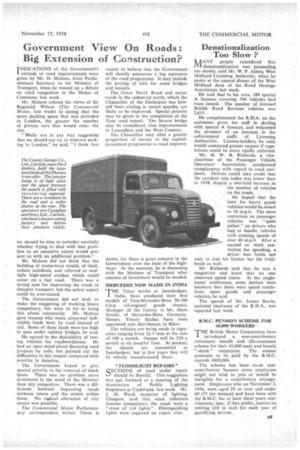Government View• On Roads : Big Extension of Construction?
Page 43

If you've noticed an error in this article please click here to report it so we can fix it.
INDICATIONS of the Government's attitude to road improvements were given by Mr. H. Molson, Joint Parliamentary Secretary to the Ministry of Transport, when he wound up a debate on road congestion in the House of Commons last week.
Mr. Molson echoed the views of Sir Reginald Wilson (The Commercial Motor, last week) in saying that the more parking space that was provided in London, the greater the number of private ears that would enter the city.
"While not in any way suggesting that we should not try to improve parking in London," he said, " I think that we should be wise to consider carefully whether trying to deal with that problem to an excessive extent would present us with an additional problem."
Mr. Molson did not think that the building of motorways would, of itself, reduce accidents, and referred to multiple high-speed crashes which could occur on a fast road. There was a strong case for improving the roads to cheapen transport, but the safety aspect could be over-stated.
The Government did not wish to make the staggering of working hours compulsory, but were to try to bring this about voluntarily. Mr. Molson gave reasons why many abnormal indivisible loads went by road instead of rail. Some of these loads were too high to pass under railway bridges, he said.
He agreed to the desirability of testing vehicles for roadworthiness. He had an open mind about financing road projects by tolls, but pointed out the difficulties in this respect compared with practice in America.
The Government hoped to give special priority to the removal of black spots. There was no problem more prominent in the mind of the Minister than city congestion. • There was a difference between improving roads between towns and the streets within them. No railical alteration of city streets was possible.
The Commercial Motor Parliamentary correspondent writes; There is
reason to believe that the Government will shortly announce a big extension of the road programme. It may include the levying of tolls for some bridges and tunnels.
The Great North Road and major • roads in the industrial north, which the Chancellor of the Exchequer has himself been visiting in recent months, are likely to be improved. Special priority may be given to the completion of the Tyne road tunnel. The Severn bridge may be considered, also improvements in Lancashire and the West Country.
The Chancellor may allot a greater proportion of money in the capitalinvestment programme to road improve
ments, for there is great concern in the Government over the state of the highways. At the moment, he is discussing with the Minister of Transport what amount of investment would be needed.
MERCEDES NOW MADE IN INDIA
THETelco works at Jamshedpur, India, have produced their first models of Tata-Mercedes-Benz 90-100 b.h.p. oil-engiried goods chassis. Manager of the factory is Mr. Hans Stoehr, of Mercedes-Benz, Germany. Messrs. Tiwary Bechar have been appointed sole distributors in Bihar.
The vehicles are being made in capacities ranging from 3-5 tons at the rate of 100 a month. Output will be 250 a month in six months' time. At present, the chassis are assembled at Jamshedpur, but in five years they will be wholly manufactured there.
"FLOODLIGHT REPAIRS " QECTIONS of road under repair should be floodlit. This suggestion was put forward at a meeting of the Association of Public Lighting Engineers at Clydebank, last week. Mr. J. M. Ward. inspector of lighting, Glasgow, said that since reflectors became compulsory, the roads were a "mass of red lights." Distinguishing lights were required on repair sites.




































































































